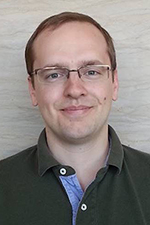
3:30 pm to 4:30 pm
1305 Newell Simon Hall
Abstract: In the future, robots could be used to take care of the elderly, perform household chores, and assist in hazardous situations. However, such applications require robots to manipulate objects in unstructured and everyday environments. Hence, in order to perform a wide range of tasks, robots will need to learn manipulation skills that generalize between different scenarios and objects. In this talk, Oliver Kroemer will present methods that he has developed for robots to learn versatile manipulation skills. The first part of the presentation will focus on learning manipulation skills through trial and error using task-specific reward functions. The presented methods are used to learn the desired trajectories and goal states of individual skills, as well as high-level policies for sequencing skills. The resulting skill sequences reflect the multi-modal structure of the manipulation tasks. The second part of the talk will focus on representations for generalizing skills between different scenarios. He will explain how robots can learn to adapt skills to the geometric features of the objects being manipulated, and also discuss how the relevance of these features can be predicted from previously learned skills. The talk will be concluded by discussing open challenges and future research directions for learning manipulation skills.
Bio: Dr. Kroemer is an assistant professor at the Carnegie Mellon University (CMU) Robotics Institute. His research focuses on developing algorithms and representations to enable robots to learn versatile and robust manipulation skills. Before joining CMU, Dr. Kroemer was a postdoctoral researcher at the University of Southern California (USC) for two and a half years. He received his Masters and Bachelors degrees in engineering from the University of Cambridge in 2008. From 2009 to 2011, he was a Ph.D. student at the Max Planck Institute for Intelligent Systems. He defended his Ph.D. thesis on Machine Learning for Robot Grasping and Manipulation in 2014 at the Technische Universitaet Darmstadt, and was a finalist for the 2015 Georges Giralt Ph.D. Award for the best robotics Ph.D. thesis in Europe.
Host: Katharina Muelling
Contact: Stephanie Matvey
